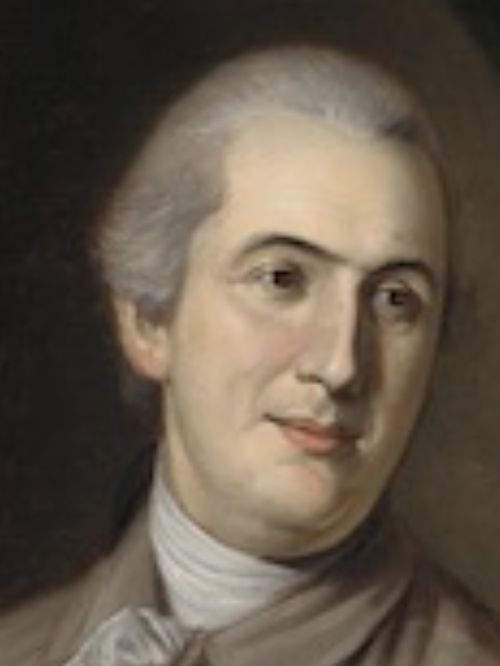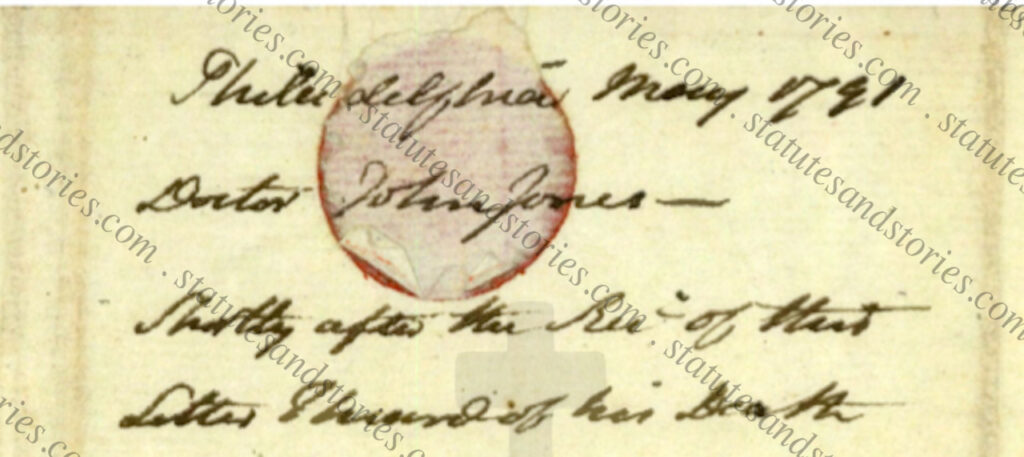Case closed: Gouverneur Morris boarded with Miss Dally
Did the Committee on Style meet in the “green room” across from the “shambles”?
Two long-overlooked letters from Doctor John Jones (the “Father of American Surgery”) to Gouverneur Morris (the “Penman of the Constitution”) help confirm the following conclusion: Gouverneur Morris boarded with Miss Dally/Dalley during the Constitutional Convention. While these recently discovered letters are enormously helpful placing Gouverneur Morris at Miss Dally’s boarding house, the letters raise new questions about the location where the Committee on Style met between September 8-12, 1787.
Last year StatutesandStories discovered a fascinating letter from Doctor John Jones to Massachusetts delegate Elbridge Gerry dated September 20, 1785. As discussed here, Dr. Jones was a long-term boarder with Miss Dally. In Doctor Jones’ 1785 letter, Miss Dally and her sister (“the ladies of this house”) sent their regards to Elbridge Gerry, who was a frequent boarder when Congress was in session in Philadelphia. Of course, Gerry would return to Miss Dally’s boarding house in 1787 for the Constitutional Convention. The September 1785 letter is also significant to the extent that it provides insights into Miss Dally’s personal politics. The letter was formerly housed in the famous Sang Collection, but was sold to private collectors forty years ago.
Because Doctor Jones’ 1785 letter to Elbridge Gerry was so remarkable, it made sense to search for other correspondence from Doctor Jones during this time period. Doctor Jones and Gouverneur Morris were close friends who boarded with Miss Dally for several years. For this reason, it was hoped that any correspondence between Doctor Jones and Gouverneur Morris might provide valuable information about Doctor Jones, Gouverneur Morris, Miss Dally, and possibly the location where the Constitution was drafted?
Fortunately, the Gouverneur Morris Papers at Columbia University contain two letters from Doctor Jones to Gouverneur Morris. With the assistance of Tara Craig and her staff from the Rare Book and Manuscript Library at Columbia, StatutesandStories.com was able to secure high-resolution images of two long under-appreciated letters from Doctor Jones to Gouverneur Morris which are discussed below.
By letter dated November 1, 1790, Doctor Jones mentions the “talents which heaven has so bountifully bestowed upon you in promoting order and good government so essential to the political happiness of a constitution you had no inconsiderable share in framing.” The last page of the letter includes a P.S. asking Gouverneur Morris to “remember me” to any of my old friends. Jones concludes the letter by mentioning that Miss Dally and her sister, Mrs. Clark, sent their regards:

- “Mrs. Clark and Miss Dally desire me to offer their best wishes for your health and happiness.”
Following the Constitutional Convention, Gouverneur Morris returned to New York after living in Philadelphia for several years. The above quoted sentence suggests that in late 1790, Gouverneur Morris, Doctor Jones, Miss Dally, and Mrs. Clark remained friends, three years after Morris had moved back to New York.
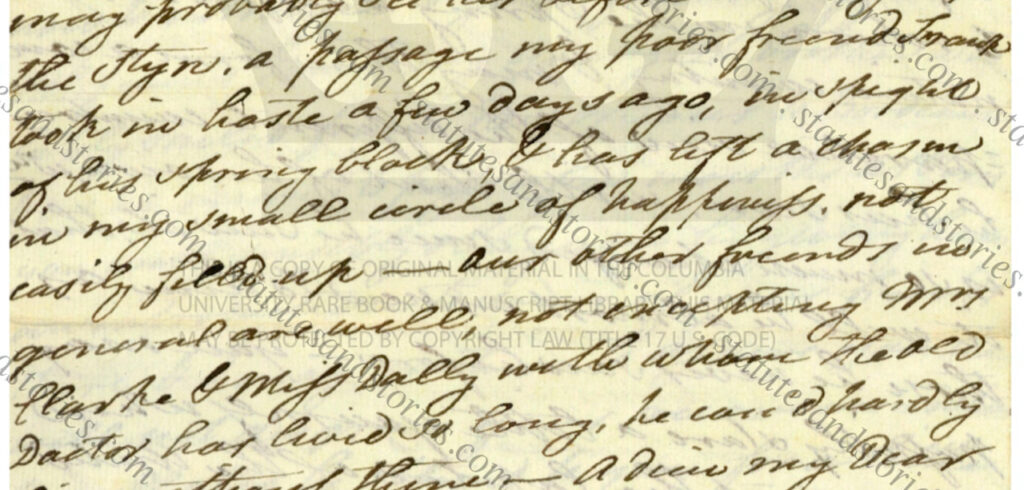
In the second letter dated May of 1791 Jones bemoans the passage of an old friend who has left a “chasm in my small circle of happiness.” Doctor Jones refers to Miss Dally and her sister as “friends” with whom he has lived for so long that he “could hardly live without them.”
- “a passage my poor friend …took in haste a few days ago…has left a chasm in my small circle of happiness, not easily filled up – our other friends in general are well, not excepting Mrs. Clark & Miss Dally with whom the old doctor has lived so long, he could hardly live without them…”
Taken together, both letters strongly suggest that years after Gouverneur Morris moved back to New York, he retained a close friendship with both Doctor Jones, Miss Dally and Mrs. Clark. The May 1791 letter specifically refers to Miss Dally and her sister as “our other friends.”
Perhaps the most significant information in the two letters is the following sentence by Doctor Jones referring to the “green room where you lived with me opposite the shambles…”
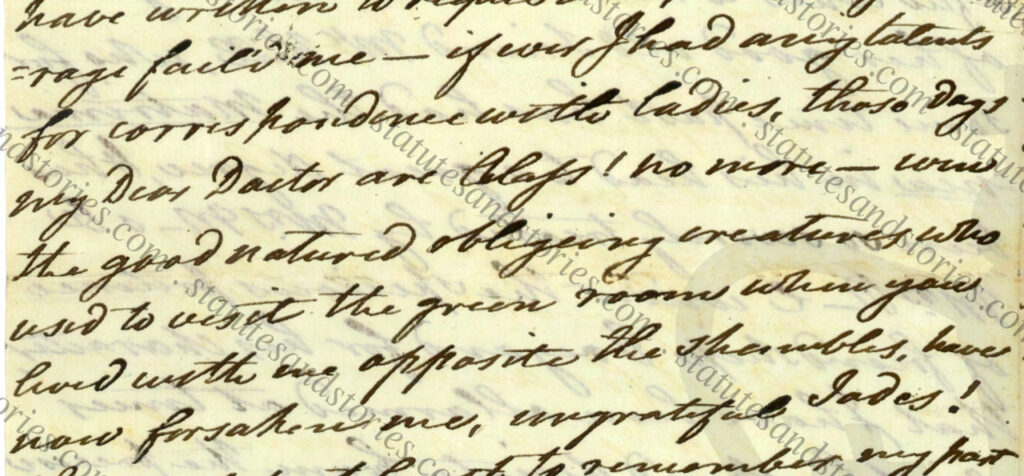
- “if ever I had any talents for correspondence with ladies, these days my dear doctor are alas! no more – even the good natured obliging creatures who used to visit the green room where you lived with me opposite the shambles, have now forsaken me, ungrateful ladies!”
This is very useful evidence that Gouverneur Morris “lived with” Jones at Miss Dally’s on Market Street across from “the shambles,” which is the covered market on Market Street (also known as High Street). Pictured below are two famous images of the shambles market, which was open on Tuesdays and Fridays. As evidenced by Philadelphia street directories, property tax rolls, and newspaper ads, Miss Dally’s boarding house was located on Market Street between Second and Third, which is directly across from the “shambles” pictured below.
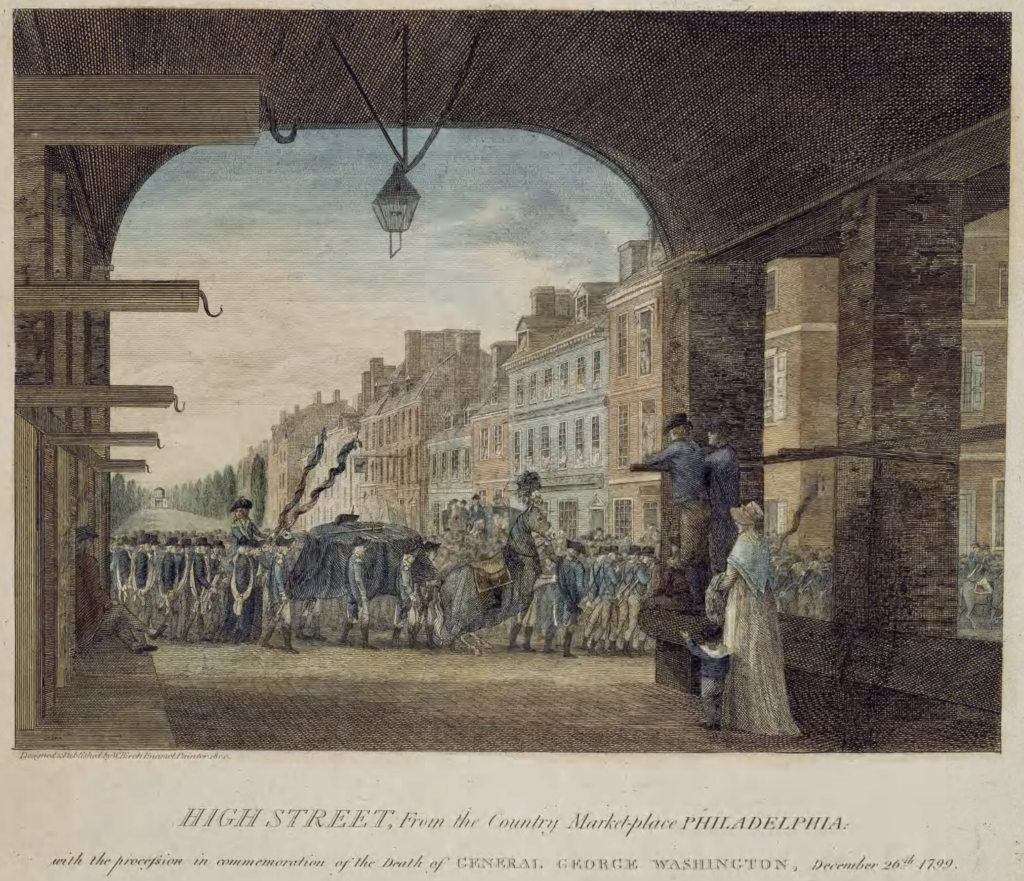
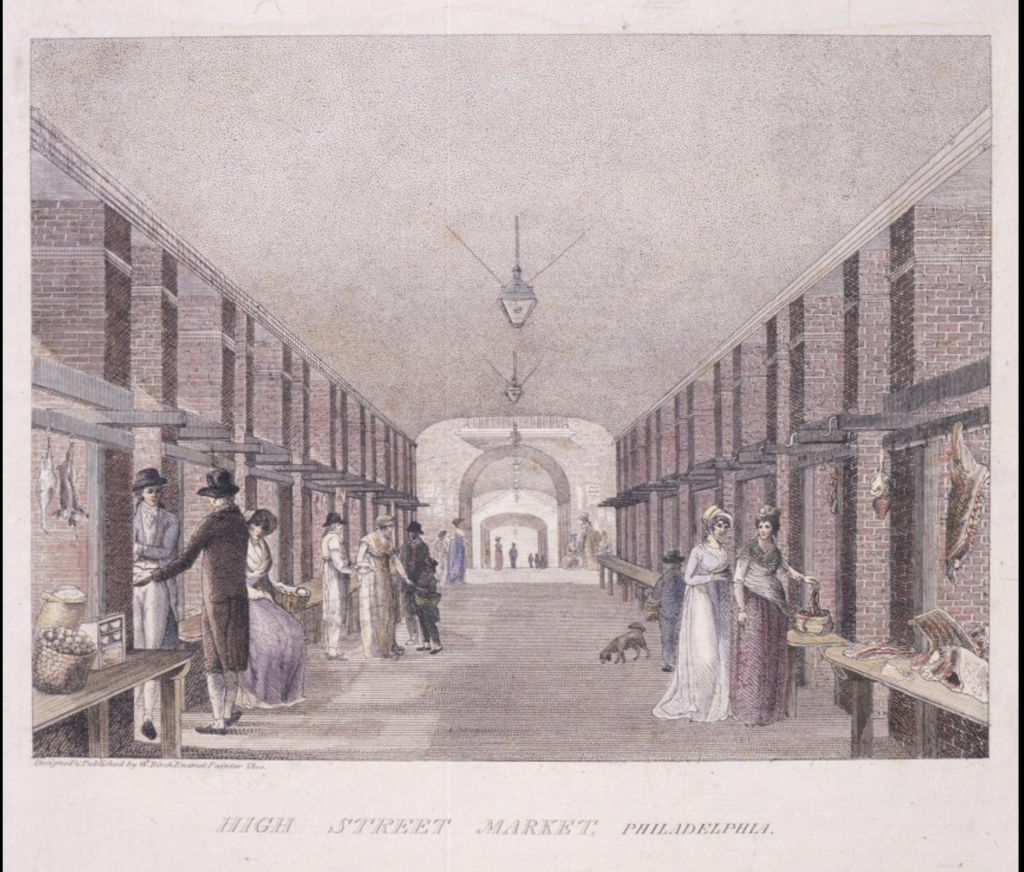
Sadly, Doctor Jones would pass away two months after writing the May 1791 letter to Gouverneur Morris. On the back of the letter Gouverneur Morris wrote that “shortly after the receipt of this letter I learned of his [Doctor John Jones’] death.”
Another famous Philadelphia doctor and patriot, Dr. Benjamin Rush, recorded Doctor Jones’ passing with the following diary entry:
This day died Dr. John Jones…aged 57…He was much lamented by his friends and patients, as well as by his brother physicians. His manners were gentle and amiable, and his conduct truly liberal in his profession. He was without a rival in surgery in the United States. His education was extensive, and he spoke agreeably upon all subjects. He lived and died a batchelor.
Statutesandstories.com has been fortunate to consult with Richard Brookhiser, one of only two living biographers of Gouverneur Morris. Mr. Brookhiser also wrote biographies of other founders, including George Washington, James Madison, and Gouverneur Morris’ close friend, Alexander Hamilton. Richard’s lingering question is “why is GM who lives in Philly staying in a boarding house? Surely he was prosperous enough to [acquire property] of his own. Or was he saving money?”
Pending further research the possible answers to Rick’s questions are as follows:
Money: Certainly this could have been a consideration. It is likely that Gouverneur Morris was cash poor, particularly when he is saving/borrowing to purchase Morrisania.
Bachelor: Like Dr. John Jones (who likely didn’t want for money either), Gouverneur Morris was a bachelor in 1787. It is likely that Miss Dally took care of their domestic needs and provided a home-like setting? One might ask, why would Jones and Morris need their own homes, with the headaches of home ownership, if they didn’t have a family in Philadelphia?
Morris was peripatetic: The Philadelphia property rolls only reflect Gouverneur Morris’ presence at Miss Dally’s boarding house in 1781, 1786 and 1787. He frequently traveled on business for his business partner, Robert Morris. Perhaps Gouverneur Morris considered himself a New Yorker who hoped to one day acquire the family estate in Morrisania?
Four “out houses“: According to the tax rolls, Miss Dally’s building included four “out houses.” It is possible that Gouverneur Morris and Doctor Jones may have used the out houses for their law/medical offices.
Friendships: As indicated by Morris biographers – and as demonstrated in the Jones-Morris correspondence – Gouverneur Morris had close and meaningful relationships with Dr. Jones (who lived with Miss Dally for over a decade), Miss Dally, and Mrs. Clark.
For a discussion of Gouverneur Morris’ bank records click here (Miss Dally Part 1).
For a discussion of Miss Dally and her boarding house click here (Miss Dally Part 2).
For a discussion of primary sources from Miss Dally’s boarding house, including receipts and tax rolls, click here (Miss Dally Part 3).
For a discussion of the Committee on Style Venue Hypothesis click here (Miss Dally Part 4).
For a discussion of pending Research Questions and Answers click here (Miss Dally Part 5).
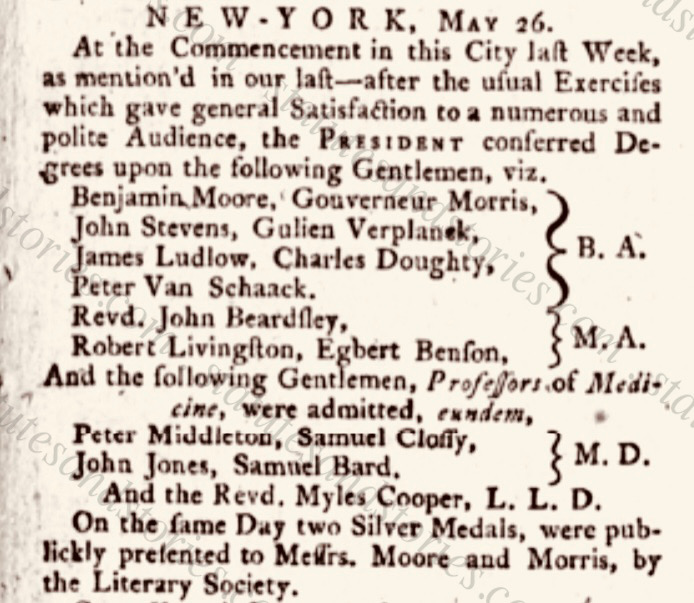
A subsequent post will continue the discussion of Doctor Jones’ career as the “Father of American Surgery.” Doctor Jones served in the New York Provincial Legislature during the Revolutionary War, when he wasn’t treating injured soldiers. After the war he was the first President of the Humane Society at the Philadelphia Dispensary which provided free medical care for the poor. Doctor Jones was also a well respected scholar who served as member of the American Philosophical Society, along with Ben Franklin and Thomas Jefferson. Doctor Jones’ famous patients included George Washington, Ben Franklin and Gouverneur Morris. The pending post will also discuss the long-term friendship between Gouverneur Morris and Doctor Jones, dating back to their days at King’s College.
